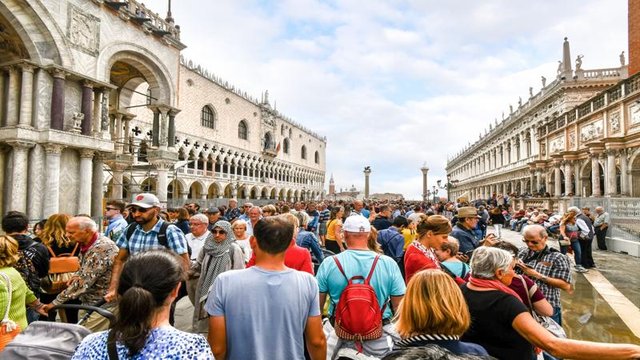
Overtourism: What is it and how can it be overcome?
July 19, 2024

In recent years, the tourism industry has experienced a significant surge, with more people traveling than ever before. While tourism can boost local economies, it also comes with challenges. One of the most pressing issues is overtourism, a phenomenon that affects popular destinations worldwide.
This blog post explores the definition of overtourism, its impacts, examples from various countries including in Spain – where protests have been taking place is popular destinations, potential solutions, and how a bachelor in Tourism can prepare you to address these challenges effectively.
What is overtourism?
Overtourism occurs when the number of tourists exceeds the capacity of a destination to manage them sustainably. This leads to overcrowding, environmental degradation, and diminished quality of life for residents.
Overtourism not only strains local resources but also compromises the experience for travelers, making it a critical issue for the global tourism industry.
The effects of overtourism
The impacts of overtourism are multifaceted, affecting the environment, local communities, and economies. Here are some of the key effects:
- Environmental Damage: Increased foot traffic in natural areas can lead to soil erosion, pollution, and loss of biodiversity. For example, popular hiking trails may become degraded, and wildlife habitats can be disturbed.
- Strain on Infrastructure: Public services such as transportation, water, and waste management can become overwhelmed, leading to inefficiencies and deterioration of infrastructure.
- Rising Costs for Locals: As demand for accommodation and services increases, prices can skyrocket, making it difficult for local residents to afford basic necessities.
- Loss of Cultural Identity: The influx of tourists can lead to the commercialisation of local cultures and traditions, reducing their authenticity and altering the community’s way of life.
- Diminished Visitor Experience: Overcrowded attractions and long waiting times can detract from the enjoyment of tourists, potentially leading to a decline in repeat visitors.
Examples of overtourism
Spain is a prime example of a country grappling with overtourism. Barcelona, one of its most visited cities, faces significant challenges due to the constant influx of tourists. Iconic sites like La Sagrada Familia and Park Güell are often overcrowded, making it difficult for both tourists and locals to appreciate their beauty. In recent times, residents on the Balearic and Canary Islands have also been protesting about the effects of overtourism, such as a rise on costs and a lack of housing options for locals.
Other countries also face similar issues. Venice in Italy struggles with an overwhelming number of visitors, especially during peak seasons. The city’s delicate infrastructure and unique ecosystem are at risk due to the constant pressure from tourism.
In Thailand, the famous Maya Bay was closed to tourists to allow its ecosystem to recover from the damage caused by excessive visitation.
How to overcome overtourism?
Addressing overtourism requires a multifaceted approach that involves collaboration between governments, businesses, and tourists themselves. Here are some strategies:
- Implementing Quotas: Limiting the number of visitors to popular sites can help reduce pressure on these areas. For example, Peru has implemented daily visitor caps for Machu Picchu.
- Promoting Off-Season Travel: Encouraging tourists to visit during less busy times can help distribute the influx more evenly throughout the year.
- Diversifying Attractions: Developing and promoting lesser-known destinations can alleviate pressure on popular sites while spreading the economic benefits of tourism.
- Sustainable Practices: Encouraging eco-friendly practices among tourists and businesses can mitigate environmental damage. This includes promoting responsible waste disposal, conserving water, and supporting local conservation efforts.
- Community Involvement: Engaging local communities in tourism planning ensures that their needs and perspectives are considered, leading to more sustainable tourism development.
The role of a degree in tourism
A degree in tourism management, such as the one offered at Universidad Europea in Valencia, equips you with the knowledge and skills to address the challenges of overtourism effectively. Through coursework in sustainable tourism, destination management, and marketing, you will learn how to balance the needs of tourists, locals, and the environment.
With a focus on practical experiences, such as internships and work placements, you will get hands-on learning opportunities to apply these concepts in real-world settings.
Moreover, a degree in tourism fosters leadership and strategic thinking skills, preparing you to take on roles where you can influence policy and practice in the tourism sector. By understanding the complexities of overtourism and learning how to implement sustainable solutions, you can contribute to the creation of a more balanced and resilient tourism industry.
In conclusion, overtourism is a critical issue that requires immediate attention and action. By understanding its impacts and exploring effective solutions, we can work towards a sustainable future for tourism. With a degree in tourism management, you can be at the forefront of this change, leading efforts to create a more sustainable and enjoyable experience for all.